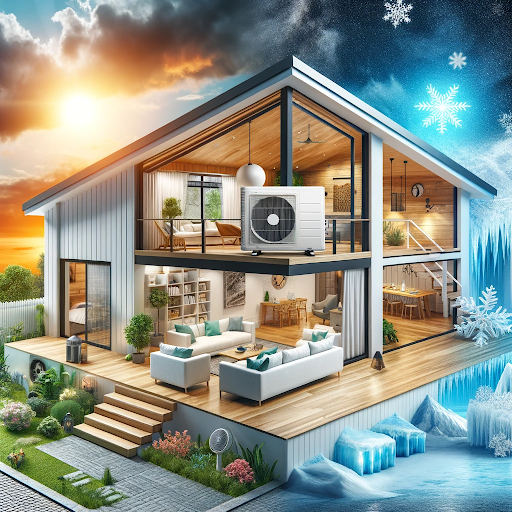Table of Contents
Introduction to Reverse Cycle Air Conditioning
Reverse cycle air conditioning systems have become increasingly popular for homeowners seeking efficient and versatile climate control solutions. Unlike traditional air conditioners, reverse cycle systems offer both cooling and heating capabilities, making them ideal for diverse climates.
How Reverse Cycle Air Conditioning Works
At the heart of reverse cycle air conditioning is a heat pump technology that efficiently transfers heat from one environment to another. In cooling mode, it extracts heat from inside the home and releases it outdoors. Conversely, in heating mode, it absorbs heat from the outdoor air and transfers it inside.
The Efficiency of Reverse Cycle Systems
One of the key advantages of reverse cycle systems is their energy efficiency. These systems can convert a significant amount of electricity into heat or cooling, making them cost-effective. This efficiency is particularly beneficial during extreme weather conditions prevalent in various regions across the world.
The Advantages of Installing a Reverse Cycle System
- Energy Efficiency: These systems are more energy-efficient than conventional heaters or air conditioners.
- All-Year Comfort: Capable of both heating and cooling, they provide comfort regardless of the season.
- Environmentally Friendly: Lower energy consumption translates to a reduced carbon footprint.
Selecting the Right Reverse Cycle Air Conditioning for Your Home
Choosing the right system depends on several factors, including the size of your space, insulation quality, and personal preferences. Consulting with air conditioning experts can provide insights into the most suitable options for your needs, particularly when considering ducted air conditioning solutions.
Installation and Maintenance
Proper installation and regular maintenance are crucial for optimizing the performance and lifespan of reverse cycle systems. Regular checks and cleaning can prevent common issues and ensure efficient operation.
The Technological Edge of Reverse Cycle Air Conditioning
Reverse cycle air conditioning represents a significant advancement in climate control technology. By offering both heating and cooling options in one unit, these systems provide a versatile solution for maintaining indoor comfort throughout the year.
Understanding the Technology Behind Reverse Cycle Systems
The core mechanism of reverse cycle air conditioning lies in its ability to reverse the flow of refrigerant. This process allows the system to switch between heating and cooling modes, adapting to different weather conditions seamlessly.
Customizable Climate Control
A key feature of reverse cycle systems is their customizable settings. Users can adjust temperatures to their exact preferences, ensuring optimal comfort in various settings, from residential homes to commercial spaces.
The Benefits of Reverse Cycle Air Conditioning in Varied Climates
- Adaptability: These systems adjust to both hot and cold climates, ideal for regions with significant temperature variations.
- Consistent Comfort: They maintain a stable indoor temperature, countering external weather fluctuations.
- Energy Savings: Efficient in energy use, they reduce utility bills while providing effective climate control.
Making an Informed Decision: Choosing a Reverse Cycle Air Conditioner
When considering a reverse cycle air conditioner, factors like room size, layout, and insulation play crucial roles in the selection process. For those in places where it gets very hot in summer, exploring options like ducted air conditioning can be particularly advantageous, offering a discreet and efficient way to manage indoor temperatures.
Installation Considerations and Professional Advice
The effectiveness of reverse cycle air conditioning greatly depends on correct installation and regular maintenance. Professional advice from experienced technicians is invaluable in ensuring that your system is tailored to your specific requirements and operates at peak efficiency.
Embracing Sustainability with Reverse Cycle Air Conditioning
In an era where environmental consciousness is paramount, reverse cycle air conditioning emerges as a forward-thinking choice for climate control. These systems not only offer superior comfort but also align with eco-friendly practices.
The Environmental Impact of Reverse Cycle Air Conditioning
Reverse cycle systems stand out for their reduced environmental impact. By utilizing advanced heat pump technology, they require less energy to heat or cool spaces, significantly lowering greenhouse gas emissions compared to traditional heating methods.
Enhanced Air Quality and Health Benefits
Apart from temperature control, reverse cycle air conditioning can improve indoor air quality. Many models come equipped with filters that reduce allergens and pollutants, contributing to a healthier indoor environment.
Cost-Effectiveness of Reverse Cycle Air Conditioning
- Long-Term Savings: The initial investment in a reverse cycle system is offset by its energy efficiency, leading to lower utility bills over time.
- Durability: These systems are known for their longevity, reducing the need for frequent replacements.
- Incentives: In some regions, energy-efficient systems like reverse cycle air conditioners may qualify for government rebates or incentives.
Practical Considerations for Installing Reverse Cycle Air Conditioning
When planning to install a reverse cycle system, it’s crucial to consider factors such as the size of your space and your specific climate needs. For comprehensive solutions, considering options like ducted air conditioning can offer a seamless integration into your home or business environment.
Partnering with the Right Professionals
Selecting the right professionals for installation and maintenance is critical. Experienced technicians can ensure that your system is correctly installed, optimized for efficiency, and maintained for peak performance.
Conclusion
Reverse cycle air conditioning stands out as a smart choice for those seeking an eco-friendly, cost-effective, and efficient way to manage their indoor climate. Whether for residential or commercial use, these systems offer a sustainable and practical solution, particularly in regions like Perth where versatility and efficiency are key.













